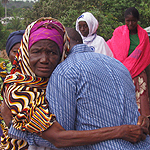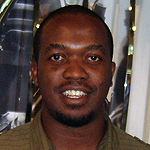The Book of Salamanders
Serenity spread her legs and her arms, and opened her body, and said, ‘Is a map.’
‘What?’
‘My body…is a map.’
‘A map of what?’
‘Africa.’
‘Serenity, girl, you too crazy.’
‘A little,’ she giggled. ‘For you.’
Mezu shook his head and laughed.
‘Come here man,’ said Serenity. He reached her, and they clung to one another. He touched her risen nipples; a slow moan exhaled from her, the prose of an abrupt will freed from its secret place; from the sacred heat of bodily hunger, desire rose. He felt her rising and rising; her almond eyes grew, until she called his name:
‘Meeezuu!’
The name clung to her lips. A whisper. His Antigone, Mezu thought. The dry-leaf crunch of her chiffon dress, its patterns swirling suddenly at her ankles, rustling off the body like silk. They clung in their fierce embrace. Nostrils flared. Motion raced towards the lighthouse, the stars phosphorous, burnt out. From Serenity’s throat, a noun came that beckoned all the sea deities to bear witness to her climax. Mezu lay in the dark and listened to the shallowness of her breath after lovemaking. She was like that always when they fucked. Peaceful. He felt her head lift slightly from the pillow, watching as he stroked a bare arm; she was shivering slightly; her shoulder hunched against the cold night as they listened to the sea’s patois.
‘You cold?’ Mezu asked. Serenity nodded silently. He gathered the blanket around them. ‘Is warm now?’
Serenity nodded, again wordlessly. The slow, fading moonlight from the crack of the door defined the black, almond shape of her eyes. She lay calm as the shore. He could feel the moonlight creeping over his body. It moved like albumen in the river outside. Rushing away. Mezu woke at 4am that same morning as the rain pounded the sturdy new thatch of his house near the river. He unlatched the door and stepped out to the porch that led to the wooden gangplank behind his house and felt the wind rush at him with pellets of rain. He stepped forward and peed in the dark, grunting.
A web of light spread its sibilant color at the shore; dry leaves, washed up to the house by water, lay where the tide had ebbed. The silver droplets fell like tall icy laurels. He had risen at the insistent noise of rain to make sure that it had not swept his canoe into the Atlantic, from where it was tethered. The boat was not there. It had drifted. There was a hole where the dugout should have been. The gradual eating away of the soil of the coast was like a wound with gangrene. He heard the squawk of egrets rising to the dark blue horizon, the wind carrying it farther and farther to the sea, until silence descended once again, to be pierced and broken into two by the javelin of a dragonfly.
He looked again and the hole was silently healing with the white surf of tidewash. The rain was falling intermittently. Then he saw the swift cloud rolling towards him, like thick, black cotton wool that had gathered all the furies of heaven and was ready to unburden them.
‘God Almighty!’ Mezu swore. He ran quickly into the room, and found his matchet. He returned, and ran down the gangplank; the water had risen a little. He began to wade down till it got to his waist. The floating water hyacinth gripped his heels. He tugged it free. But they were growing and massing around him; the darkness made them eerie. Mezu cut and cut, slashing through the water, like Moses with his divine rod and anger. The canoe was floating free in the distance. Then he saw the swift crossing. A quick lightless movement; a mighty thing far from its home. ‘God Almighty!’ He cursed under his breath again. The animal was taking its time. Mezu saw its saw-like teeth gleam in the dark as it yawned, nodding to the echo of the sea. Its great slow tail was moving with the water. Then Mezu saw its vicious, frightened eyes; fiery and red; like split pods. They grew in the silence that lasted a century. In that silence, time receded. Mezu stepped outside of it and saw it all rushing back: the mist lifting, the strength in his eyes returning, the river deity, Idemili, lifting him up and showing him the Island, reminding him that he was nothing but a fisherman born and bred in Aboh. The rising moan of the sea-urchin, the rusted cry of the egrets, the clear bottom of the river’s memory, depthless and beyond time; the greyed elders of the past — ndichie — sitting, sad-eyed, grieving at the devastation of the race, first by the slave trade, then by international usury. They were framed in silence. Drunken with too much of the palmwine offering, Speechless. When they spoke, they spoke in a lost tongue. The tongue of fishermen. Then his dead grandfather came, still bearded and grey, hunched like the island, and threw down a rope of vines to him. Mezu climbed nervously, slowly, out of the depths, hearing fragments of the psalms somewhere in his head:
‘Out of the depths, my cry…
out of the depths, my cry…’
Slow and steady like the pilgrim’s progress. Mezu shivered from this revelation. The gods had deserted Aboh. They had fled because smoke had defiled their forests. In their place came the one Christian god, the cruel Jehovah, who would brook nary a competitor because he was a jealous god. Iron veins buried inside the bowel of the earth piped the thick fluids of the earth and drained the land of its life-blood; and fed the blood to vessels which made the seven sisters corpulent, as only witches could be, who sucked and lived on the blood of others. He heard the whine of the generators. Their shark-jaw buried into the skin of the trees sent the trees crashing. Some into the sea. Some into the fire. The gods were down, hewn by the hands of men. Logs of wood lay in abundance everywhere. Trunks of fine obeche. The forearms of the mighty and proud Iroko lay like orphans after a carnage. It was genocide. Rare red wood, preserved by many years of sacrament fell to the remorseless axe which struck at its branches. These would not be left to rot on the open roads. Canoe-builders, musket makers, wood workers descended on the island and trundled off huge trunks of wood. Some of the trunks became canoes. Adzes and chisels cored the trunks, and in the heat of the days, the hollows chiselled to perfection, held the swaying bodies, as they exhaled into the sea. Mezu watched everyday as his own trunk of Obeche began to shape under the adze. He felt the parts form in the hands of Moloku, the best canoe-builder in Aboh, a man whom you did not rush, for sculpture was not the surugede. It was Agwu at work. Finally, everything came together. Two canoes lay by the bank of the river, one for him, and one for his best friend, Merengue. He brought a chicken and made incantations to the sea goddess, praying for swiftness, good wind, and abundant catches; he wrung the neck of the rooster, and sprinkled its blood on the canoes. He took his canoe home and painted No Condition is Permanent on its hull, with a flaming white paint. There lay the canoe now, swirling beyond his reach. And in front of him the flaming eyes — the crocodile — his eyes fecund with fear and hatred, lay between him and the canoe. Feeling death inside him, Mezu struck. The animal lunged. The knife swayed and caught it on the head. Mezu struck again, blindly, and blindly he prayed for strength in his hands, again and again, wrenching his knife repeatedly from the almost severed flesh and trunk of the croc as the knife cut into them, knot by knot. He tried to drag the dead monster to land but it was hard. He pushed it, till he got to Merengue’s canoe moored silently nearby, and found a rope of hemp, and tied the animal and dragged it ashore. It was medium sized.
Later that day, the fishermen had returned from sea, and the Little London Café had become jolly. It was the most famous bar in Aboh, this house of stories and consolation. Here, Men returning from the high sea came first to slake their thirst and cool the nerves; fire some gin, before going to the fishmarket further down the road. Merengue was already there. So was Tiodor. Placidus. Anicetus. Chrisogonus. Major. Mangala. Fishermen all. Sometimes, they were smugglers of anything from illicit gin to illicit guns. It was the new economy of the sea, since the water began to yield fewer and fewer fish. There they all sat, some in the light of Ma Abigail’s Little London Café, their tendons coiled by the surf; some hauling their oars aboard, others just cleaning the planks outside the door of the Café, whistling a tune to the sea. They blew their noses to ease the smell of the ocean, gossiping about fish, and about the unspeakable things all fishermen see high on the waters where everything was still and the mist had many faces. They loosened the knots of their bodies with extravagant laughter and camaraderie. As Simple hobbled in, they hailed him.
‘Agaba-Idu!’
‘Simplicity!’
Simple smiled; his face as broad as the day. He shook hands all around. These were his main men. This was where men came to fortify themselves with gin and palmwine, before setting out to sea again by the fall of light. That was the life he missed very much. The sea. Fishing with men. Ai! The sore on his leg would not let him touch the oars with certainty. It would not even let him drink and hang-up his drinking gourd adequately.
‘Nwanyi-Asaba!’ Merengue bawled out to Ma Abigail, ‘Give Simple a bowl of the hot stuff! Put it against my name!’ Simple sat among his former canoemates, feeling their warmth. Everyday he saw them off. Watched them as they rose with the morning dew to prepare for the sea. They oiled themselves with herbs. Fired their guts with kai-kai, the local gin, brew of the island, one hundred percent alcohol; passing it round from hand to hand in the ritual of kinship as they scrapped the rust from their anchors, and pronged the iron of their will until it bent towards the gaping mouth of the Atlantic. He would sit on the same stump of the oil-bean tree and wave them off. They would watch him till the fog embraced them and their rattling oars fell silent with the sea. He would then limp under the galloping light, his teeth clenched from the pain in his groin, through the quiet street to Ma Abigail’s. She would understand and put out the gin, and leave him alone to drink quietly in the stale smell of the previous night. After that he would go, in season, to show the tourists around the Island. The men always returned at sunrise. From their chatter, it seemed, the woman of the sea was not unkind today. When Simple asked, Mangala said good humouredly, ‘Sea-never-dry.’
‘Awu! But the rain shook my bones today. No be small!’
‘Mezu catch crocodile!’
‘Son of a gun!’
‘Thief of a rope more like!’ It was Merengue. His sudden terseness did not lift eyes. Everybody understood. Even Seven-Seven, the bar-minstrel understood. He was half-blind, and old, but he was not a fool. He understood.
That morning, he too had risen early to make coffee in the half-light. He had pumped the small Tilley stove until its gaslight flooded the room. Then he had placed the enamel kettle on the bluish light. He always loved this early morning ritual. Come rain, come shine, Seven-Seven always woke at 4 am, when the denizens of the island were either going to or coming from the sea. He loved to feel the water bubble on his stove, and then boil until the kettle whistled like the frantic train. He had just brought out the sachet of the Bongo Instant Coffee, when he heard the dog whine outside the door, and the roosters cry far away in a voice muted by the rain. Just then he peered through his window and heard Mezu struggling to pull the beast to shore in what was surely Merengue’s berth. The rain had become a drizzle. Seven-Seven made his coffee, and groped his way to the rocking chair, and sat by his window and listened. His eyes owlish in the thick lenses, could barely make out Mezu’s laborious gait. But Mezu’s voice was unmistakable as he cursed the dead weight:
‘You come for the wrong side of town, bitch!... you no monkey with Mezu again, forever and ever bitch…come along bitch!...’
His feet stabbed at the mud of the street. Mezu finally managed to rope the croc and hoist it on the wooden stake. He then got a bucket and fetched water. He threw bucketfuls of sea water on the dead thing, to wash it clean of sand and grime, and blood. Then he lowered it on the plantain leaves which he had cut and spread on the ground. He let the sea-wind salt it. From his window, Seven-Seven sensed it all, and noted that the early morning rain which had slowed to a drizzle added a little mystery to such a lonely labour. He was moved. He groped his way to the door to let in Billy-boy, his dog. The dog was already insistent, scratching at the door, frightened by the on-rush of dawn, and the cruelty that had just taken place, thudding its tail on the floor outside. It came in whining.
‘Haish! Tut...tut...’ Seven-Seven consoled it. The dog sat. Seven-Seven sat. He drank his coffee and smacked his lips. He loved the bitter brew. He knew that two angry roosters would fight in the morning. He began to whistle a tune quietly; Izarel Woba Njemanze. He loved to contemplate the sea; to watch the boats and their far-off sails; to watch the water change colour as morning arrived on its shores. The sea was memory. Ogbuide, Njaba, Omambala, Orashi, Otamiri: the mystical fingers of the delta; the ancient grave of gunwales where local lore still remembers the visit of the redman, Odysseus, as well as the ones that came many years after, with such names as Esperanza, Amistad, Jesus, Hope; where his own grandfather, Ediabali, had scooped the leaf-bilge from the oars of the Aro trade. History walks in identical strides, only that men with all their eyes fail to see. He, half-blind, however hears what the sea had to say, even if it came in whispers, even though his eyes had become almost stones.
He sat recounting the past of another odyssey in the Nigerian Navy. Then the civil war. Then his discharge because he fought for Biafra, and the bitterness. The many years in the Merchant Marine where he found work as a musician. Then the disease, from the salt-wind, that slowly ate his vision, until his eyes became a silt of yellow moss. His hair may have greyed, white as the salt-teeth of surf, and his eyes almost lost to the disease, but he was nobody’s fool. He heard things. He heard, as the poet of the Carib often loved to say, how ‘Two birds quarreled at breakfast.’ He heard it in the voice of Merengue that moment.
‘Thief and son of a tribe of thieves! That’s who he be!’ Merengue scowled. He was a muscular man of average height. A tuft of beard on his chin gave him the look of a radical Moslem cleric. One of the bar maids came and poured the white gruel of palmwine in his cup at that moment. But he hardly took notice.
‘Easy bros!’
‘Easy my yansh! I will say it before God and man!’
‘Because he borrow rope catch crocodile?’ Mangala asked, incredulous. But Merengue was never to be mollified by logic or by camaraderie. Sometimes, the stars align wrongly, for at that moment, when his name had slipped out of Merengue’s acidic tongue, Mezu walked in to sullen silence. He stood for a while taking a measure of the scene. He looked at the familiar faces, and asked them wordlessly to account for such gossip. But Merengue was not in the mood for intrigue. He sprang to his feet in great fury, and wagged his rugged finger at Mezu:
‘I have told you, never, never, touch anything of mine. Next time, I go show you pepper!’
Mezu took a full measure of the fuming fisherman. He locked eyes with him for only a few minutes; brief but it seemed like eternity. He shrugged, shook his head in mock pity, and as though he had looked through a brick wall, walked straight to a corner of the bar and sat down, positively unmoved by the rant. He cleared his throat and ordered a jar. He brought out a toothpick from his hair and began to pick his teeth silently, deliberately. This ostentatious, deliberate disdain seemed to further infuriate Merengue who yelled, ‘You think you’re king of this town, you rope stealer?’
Mezu maintained an outward calm. He rubbed his hands delightedly at the arrival of his palmwine, and began to drink contemplatively. Merengue continued swearing and cursing by the deities of the river. Ma Abigail then raised her voice and said to him, ‘Calm your nerves, man!’
‘Tell the ashawo bastard to leave my things alone!’
‘He done hear!’ Madam Abigail said testily.
But by this time Mezu had had enough. He said in a clear, deadly voice: ‘madness has eaten your heart.’
Merengue sprang once again to his feet, from where he was seething. He whipped out a bailing knife, and in a voice full of gravel said: ‘I will scar you, thief!’
Mezu got up on his feet too. ‘You think you craze? Come along and I will show you who craze pass!’ he too pulled out his own bailing knife. His eyes stony now; gleaming with mischief; his lips full of a hard quiver. ‘Come along!’
Merengue was trying to break free from restraining hands and soothing voices. Some of the hands and voices went also to Mezu to calm him, ‘Cool down man!’
‘No, leave am, make we tangle!’ Mezu said fiercely.
‘No two-fighting in my bar… out! Out, all of you this minute, if you want to fight!’ Ma Abigail began to collect bottles and plastic jars, and glass tumblers stained from years of use, sensing the electric charge in the air. Mezu returned to his jar of palmwine.
‘If you feel like a man come out and fight!’ Merengue said fiercely, still held by restraining arms, the veins on his neck stiffening like giant earthworms.
‘Alright!’ Mezu rose, and at that moment everybody understood that a fight was inevitable. They flooded out from the bar, and came into the open, to the sudden sparkling light shower of that mid-noon. Wrath was in the air. They stood in the shade of the gmelina tree outside the Little London Café. Simple was flabbergasted. Seven-Seven was bemused. Ma Abigail came out at that moment clutching her breasts, two full melons of them, and said: ‘No two-fighting with daggers in front of my bar. Go…go to your graves with your ill-luck…but not here!’
The two gave up their bailing knives. And now, when it seemed like there was going to be street entertainment, some of the townsfolk began to emerge from the green shades of their houses, and soon a good crowd gathered under the drizzle in front of the Little London Cafe, waiting for the fight that Merengue wanted badly. Some of the fishermen began to egg on the fighters with the sudden cruelty of hard-eyed gamblers at a cockfight. Rashid, the mechanic’s boy down the road, made a great show of sweeping the circle clean with a broom, to neutralize any spiritual advantage.
Mezu spit into two of his palms and clenched his fist. He took a stiff, iron-legged stand, like Dick Tiger his favorite boxer. Merengue strode towards him, the drizzle was unrelenting and lent a fierce sobriety to the moment. In a flash the two men embraced themselves in a dogfight. Their arms became pincers; and they strained their muscles, circling; listening to the factional roars egging them on. Soon, their thighs crossed, their tawny flanks stirred to the pounding voices.
The villagers ranged around them, unabashed, under the clear shaft of enamel water, shouting with the many voices of the sea, ‘eeh! eeh! ooh!’ - hoisting their arms into the air when an upper-cut landed, and hissing in regret, at a near-miss, unwilling to separate two angry bulls whose gritty, gnashing and foaming anger ran like the emerald breakwater of the Atlantic. Soon they were gathering moss in the mud, rolling in the splashing shallows mixed with the drizzle, their curses hoarse, sounding like the shoal. Seven-Seven’s near-sight took in the scene, and he shook his head ruefully. How men can kill their once best friends in rage; the kind of envy which tore through the heart of these men, from shoulder to shoulder, these brothers, fishermen of the delta, mystified. But he knew what the rage was all about: her name was Serenity. The dogfight was a duel in her honour. 
This is an unpublished excerpt from a forth-coming novel of the same title.
Copyright
© African Writing Ltd & respective copyright
owners. Enquiries to permissions(at)african-writing.com.
![]()










